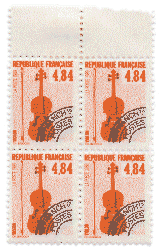
| Home |
| The Society |
| Officers |
| History |
| Precancels |
| Membership |
| Glossary |
| Library |
| Links |
What are Precancels?
There is no single definition of a precancel, but perhaps the most satisfactory is that given by the US Precancel Stamp Society Inc, which states that “... a precancel is any postage stamp, stamped stationery, or revenue stamp which has been cancelled prior to the actual use for which it was issued, by, under the supervision of, or with permission of proper authority, with a device that was used for no form of post-cancelling by the same office”. Countries which have issued precancels have different regulations governing their use, but in general they are employed by mail order companies, religious and charitable organisations which handle large quantities of bulk matter. In most countries, the general public are not permitted to use them; only authorised users may do so. Apart from the United States, which is by far the largest precancel issuing country, substantial use of the system has been made by Canada, Belgium, France and Monaco. Other countries have used precancels on an experimental or limited basis; these include Holland, Luxembourg, Algeria, Tunisia, Hungary, Turkey, Danzig, Austria, Venezuela, Peru, Argentina, United Nations and even Great Britain. |

